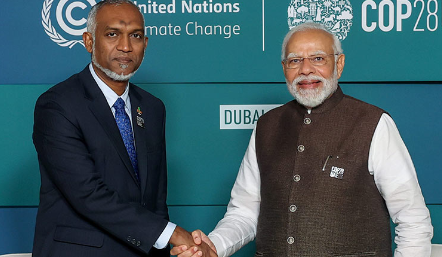Ishika Kumar, Pune
The withdrawal plan and the decision emerged from discussions between the Indian and Maldivian governments, culminating in an agreement during the India-Maldives High-Level Core Group Meeting on 2nd February 2024. This diplomatic dialogue defines the dynamic relationship between the two nations.
Indian military’s withdrawal preparations in the Maldives have been initiated as per the 15th of March 2024 demand to withdraw. India’s decision to withdraw its military presence from the Maldives marks a significant shift in regional dynamics in the area. The preliminary group of civilian personnel from India has arrived in the Maldives to commence the transition process. The civilian personnel which have arrived in Addu, is the southernmost atoll of the Maldives and is tasked with managing aviation equipment. Their deployment aims to replace Indian military personnel responsible for operating a helicopter.
Indian technical personnel with the highest competency will replace the current military personnel, aligning with Malé’s request for complete withdrawal by May 10. The phased replacement process includes 88 military personnel responsible for managing aviation platforms, consisting of helicopters and a Dornier aircraft.
India’s military presence in the Maldives has historically served its strategic interests in the Indian Ocean, amidst regional competition, notably with China. President Mohamed Muizzu’s administration’s decision reflects shifting diplomatic dynamics, favouring closer ties with China over India. President Muizzu’s commitment to reducing Indian military presence completely aligns with his administration’s pro-China stance, which is quite evident in his inaugural address to Parliament. The decision signifies a broader agenda to assert sovereignty and minimize foreign military influence as much as possible. The withdrawal follows a phased approach, with the first batch of replacements to be situated by March 10, the handover will be concluded by then, and the remainder of replacements will be placed by May 10. This transition is a core action of the Maldivian government’s determination to pursue an independent foreign policy agenda, which they aim to achieve.
The aviation platforms managed by Indian personnel facilitate crucial humanitarian and medical evacuation services for Maldivian citizens. The handover process also aims to ensure the continuity of these essential services under Indian civilian management. India’s withdrawal of military presence from the Maldives reflects evolving geopolitical dynamics in the region, with implications for bilateral relations and strategic interests. The transition to Indian civilian management signifies a recalibration of foreign policy priorities by the Maldivian government, encouraging sovereignty and regional autonomy.
